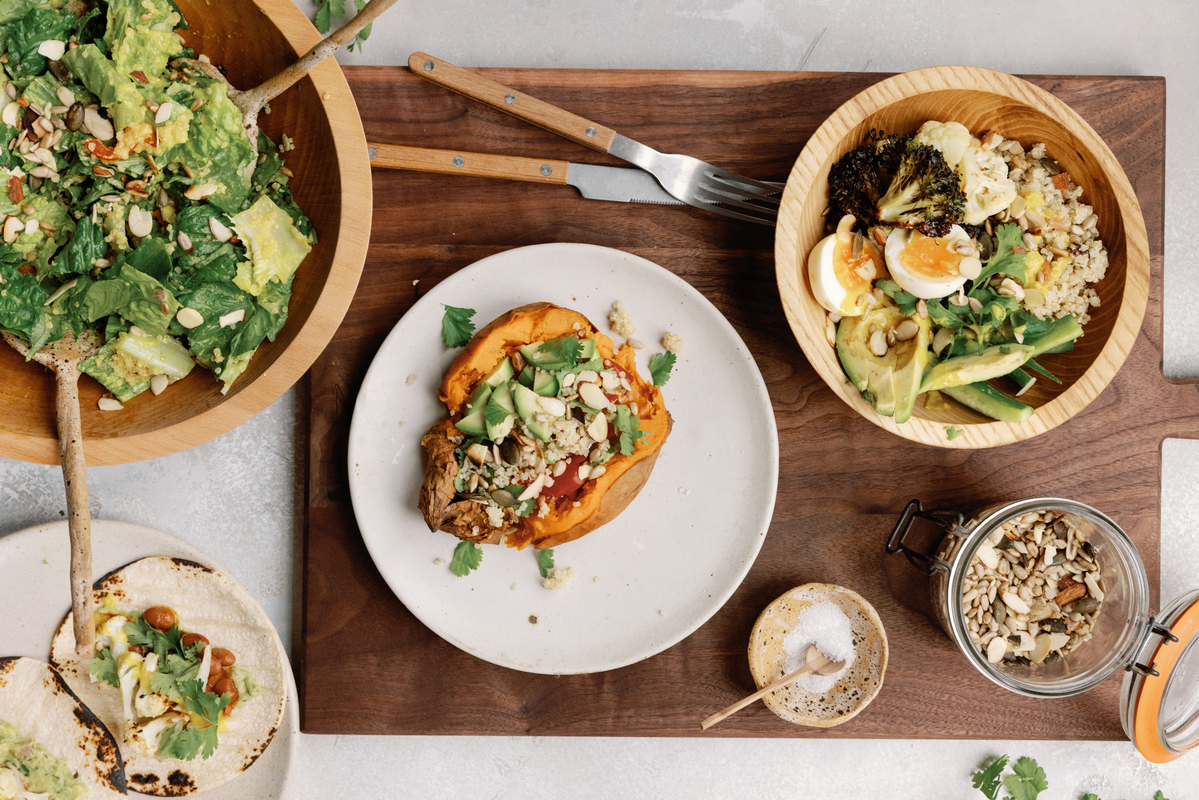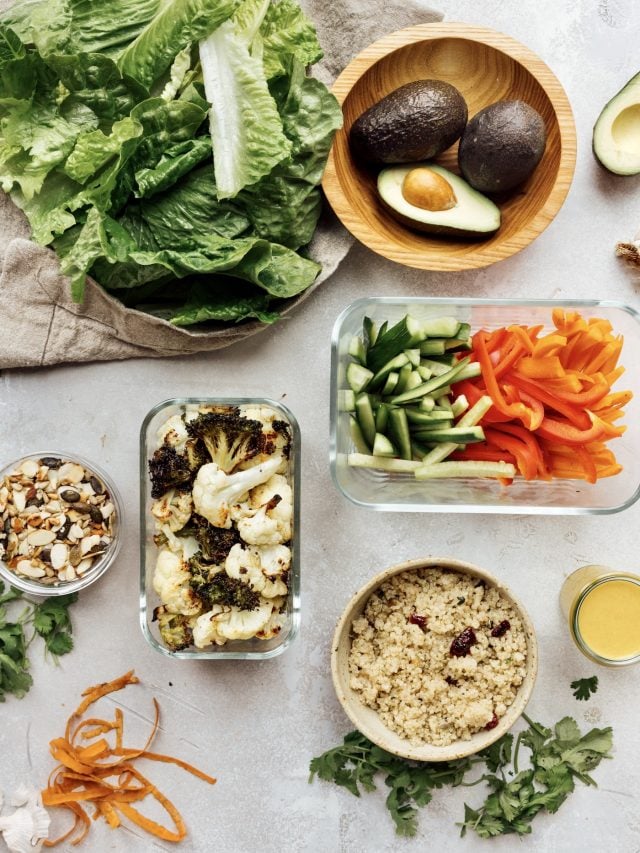One morning earlier this month, I awoke to a winter wonderland outside my window. The trees were silhouetted in ice, and everything sparkled. I would have enjoyed the beauty, except that the power was out, school was cancelled, and the house was freezing. One thing I felt really grateful for in that moment was that I’d spent a couple hours the day before filling our fridge with the building blocks of some delicious meals. There was a chicken and rice soup, lots of fresh greens and chopped veggies, creamy hummus, and a batch of morning glory muffins ready to be slathered with butter.
One of my friends recently told me that for him, “happiness is a fridge full of food.” It struck me that there’s a specific comfort that comes from knowing you have the makings of a delicious meal at the ready. Of course, the busyness of modern life means that most of us don’t have hours to spend preparing complex meals.
When I get home at the end of a long day, I want to have some healthy food options at the ready—and I promise that once you’ve stocked your kitchen, you can make nourishing meals easier than ordering takeout. For me, prepping ingredients ahead is the only way that I’m going to stick to healthy eating with a busy schedule. Enter: meal prep for the week.
How I Meal Prep for the Week
That’s where my easy meal prep strategy comes in. Every weekend, I make just a handful of simple “building block” recipes that I can use as a jumping off point for countless nourishing meals during the week. Roasted veggies can top a salad or fill a sandwich. A pot of quinoa forms the base of a grain bowl, or can become a cozy breakfast porridge. These base recipes are infinitely versatile, and part of the fun is getting creative and figuring out different ways to use them.
Watch the video above to see exactly how I knock out these five meal prep tasks in about an hour, then read on for the exact instructions. But first, some tips for meal prep success.
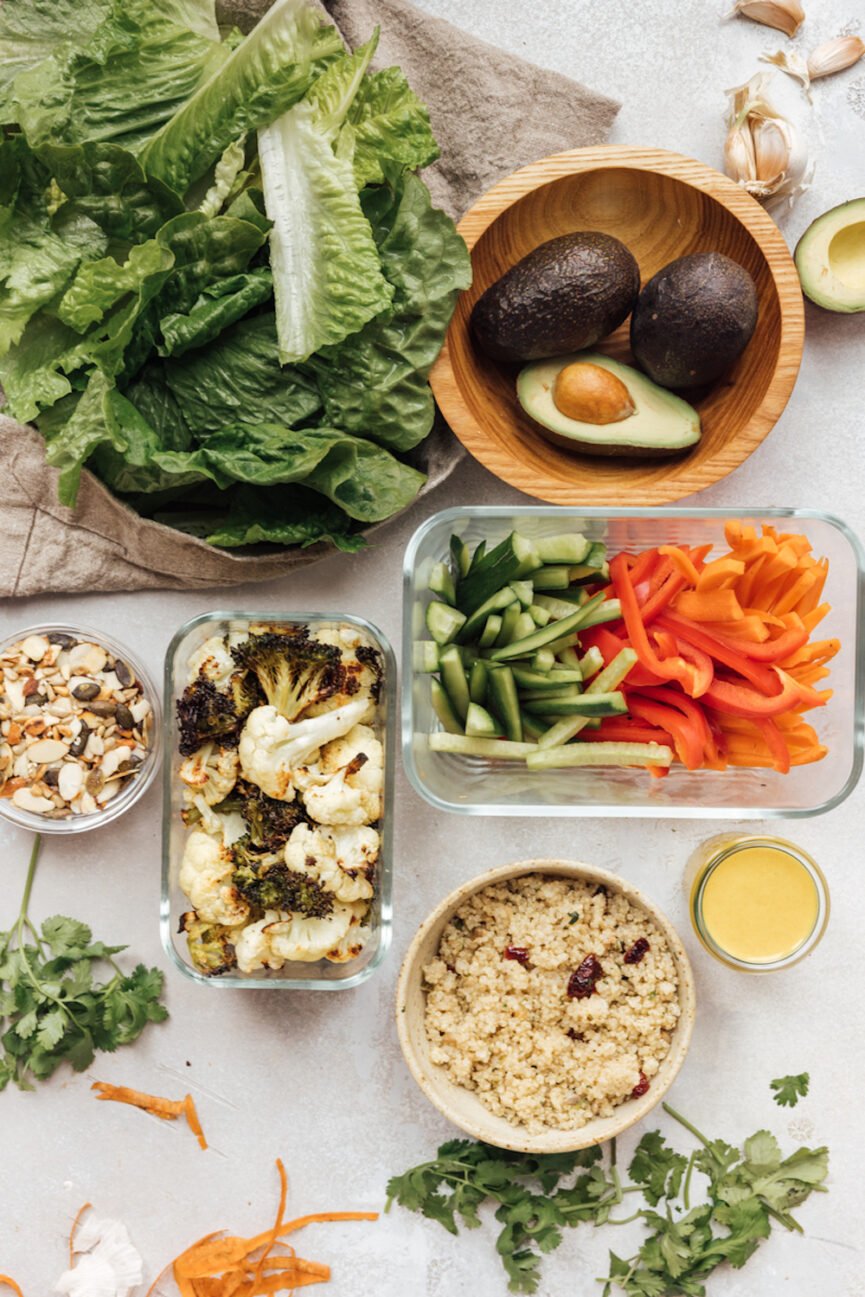
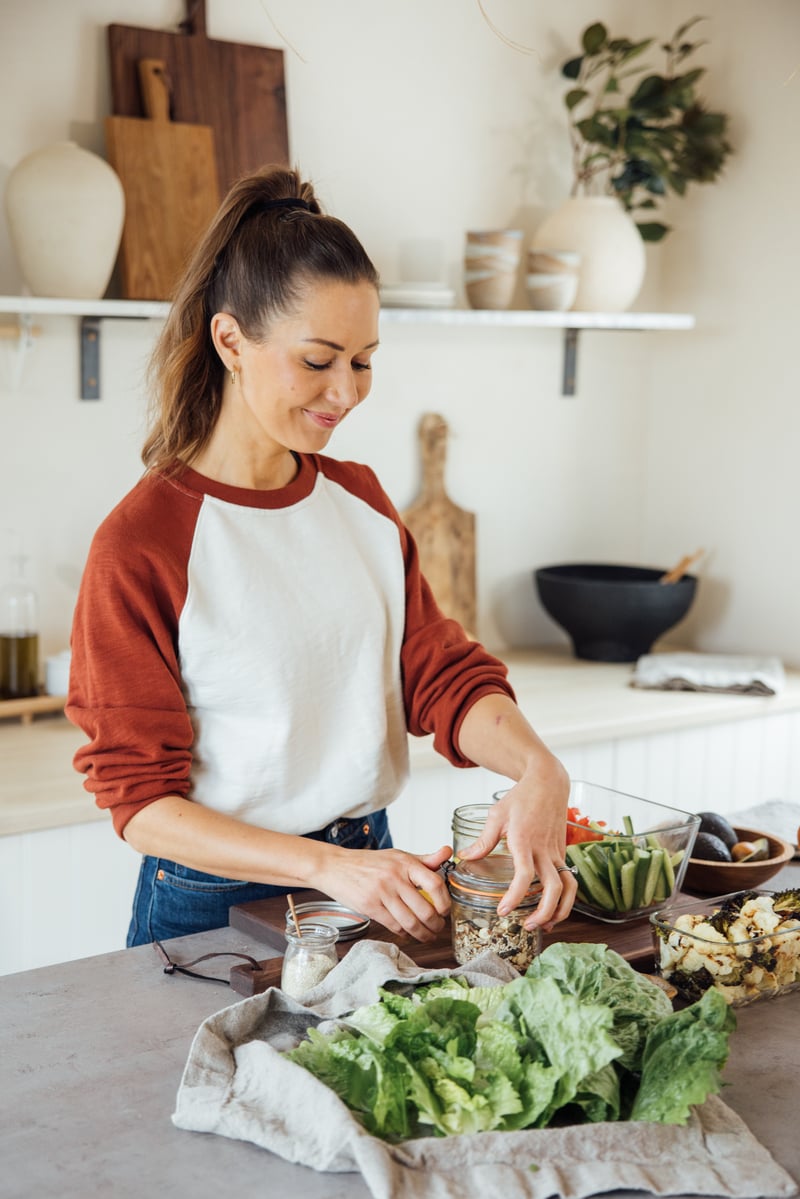
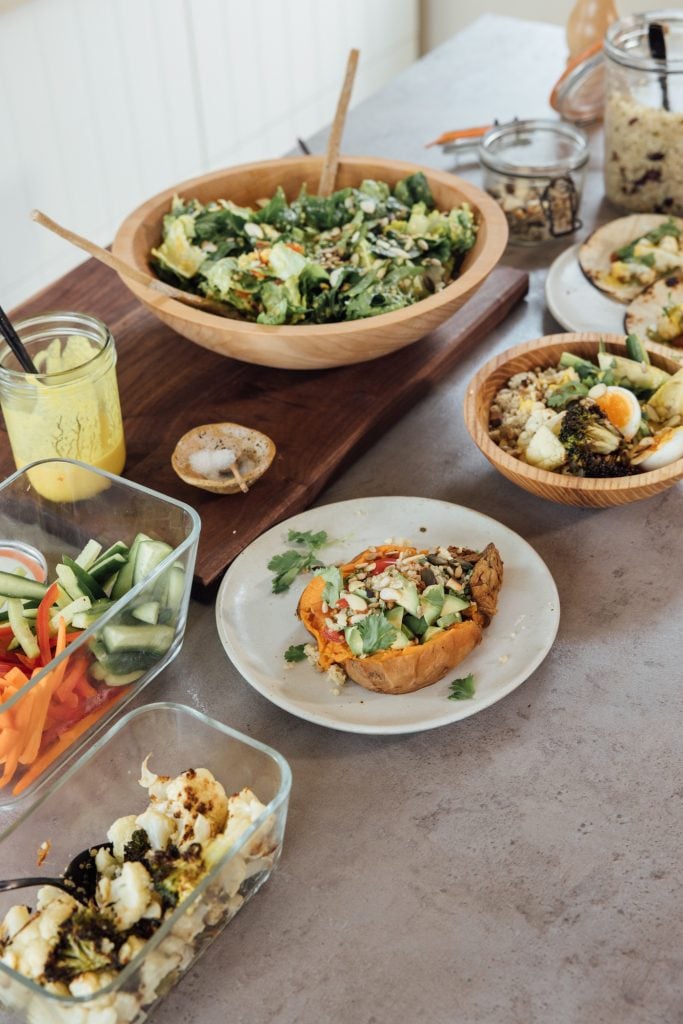
Prep With the Seasons
How do I decide what ingredients to use in each of these base recipes? For me, it’s all about getting inspired by what’s in season. When you have fresh lettuces or a deep orange sweet potato or perfectly ripe strawberries, they don’t need much to turn them into a delicious meal. It also means you’re getting the maximum nutrition from these whole, unprocessed foods so that you can really look and feel your best.
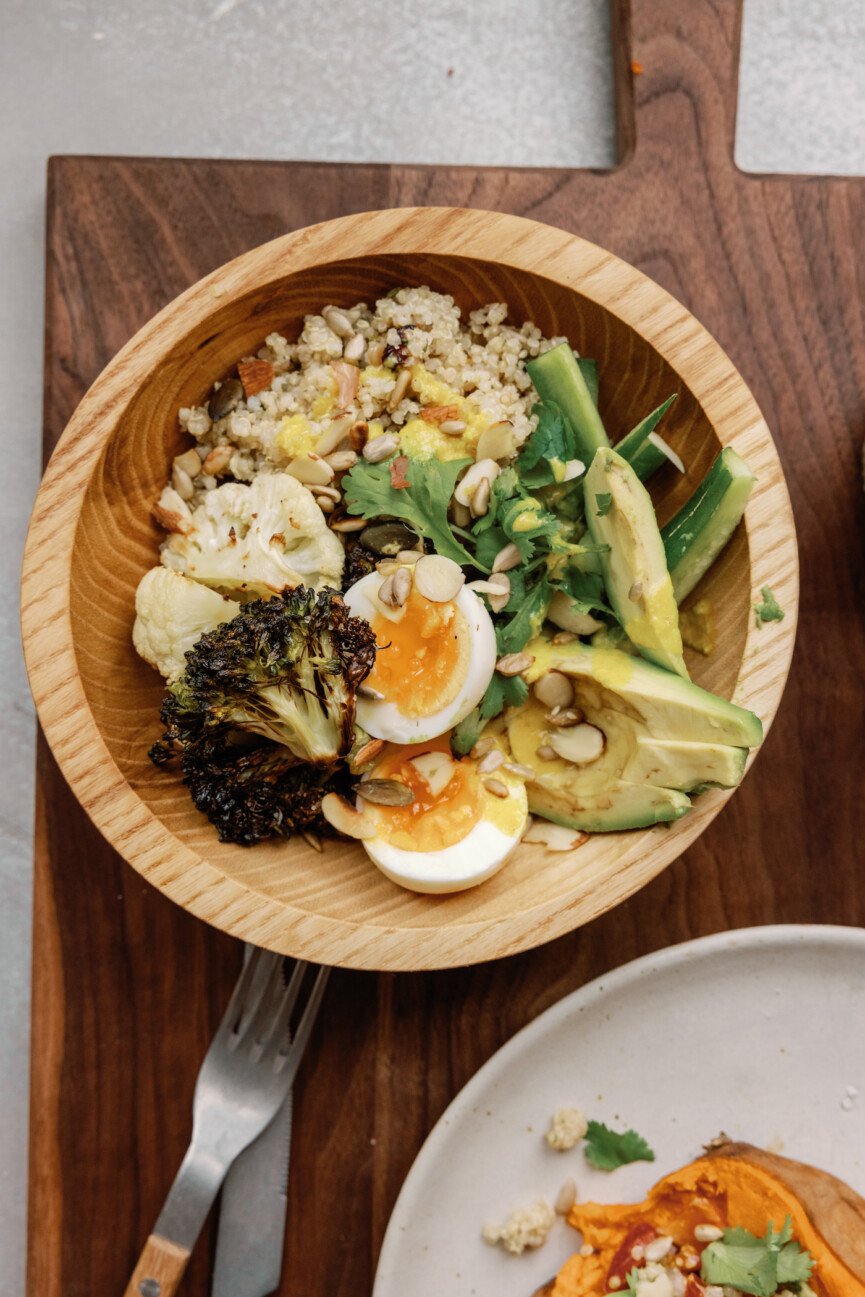
Practice Mindful Cooking
If you think you don’t have time to meal prep on a Sunday, try thinking of it as a self-care moment—something you can take your time doing and enjoy the process. I love to pour a glass of kombucha, wine, or make a hot tea, turn on some music, and make my meal prep a ritual. And that amazing feeling of opening my fridge at the end of a long day and being met with healthy, delicious options? The ultimate reward.
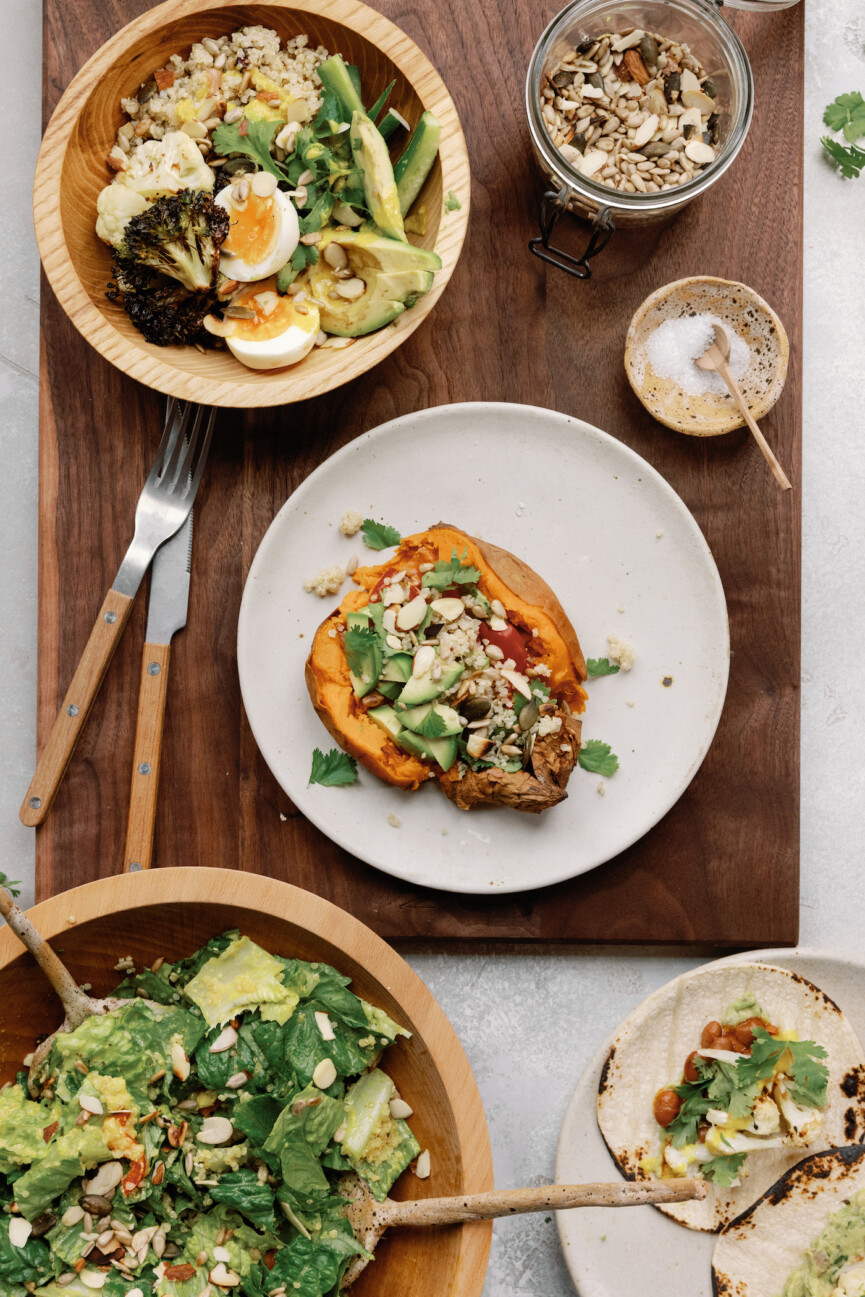
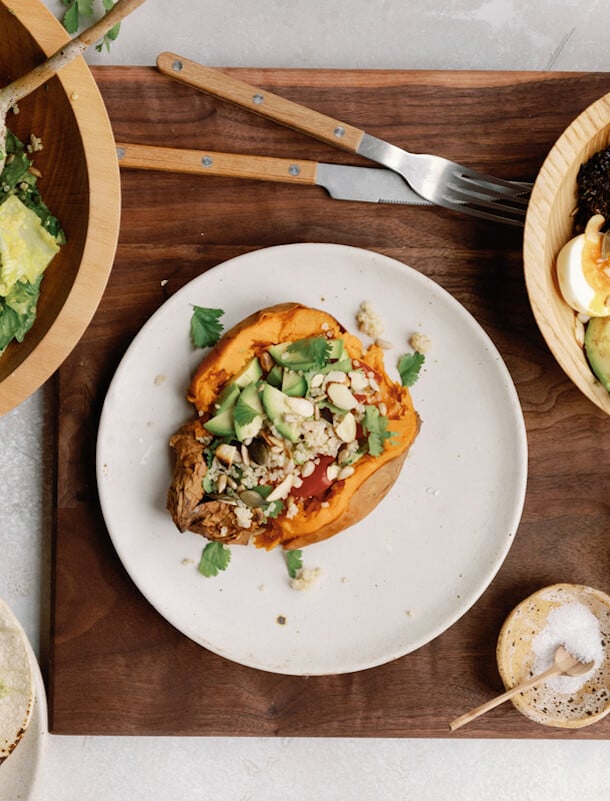
Keep It Easy
You don’t need tons of time (an hour or two is plenty!) or any fancy equipment. Most of these recipes only require a knife, a cutting board, and a sheet pan. I try to be productive and make the most of my time: while the veggies are roasting and the grains are cooking on the stove, I make my dressing and my crunchy seed mix. You’ll get in your own rhythm and eventually won’t even have to look at any instructions. After doing these a few times, you’ll find your flow.
Friendly Reminders
- Clean as you go.
- Write down a list of what you’re going to do in advance so you have a plan of action.
- Remember that even if you just make a couple of these, it will still make a big difference during the week. Do what you can!
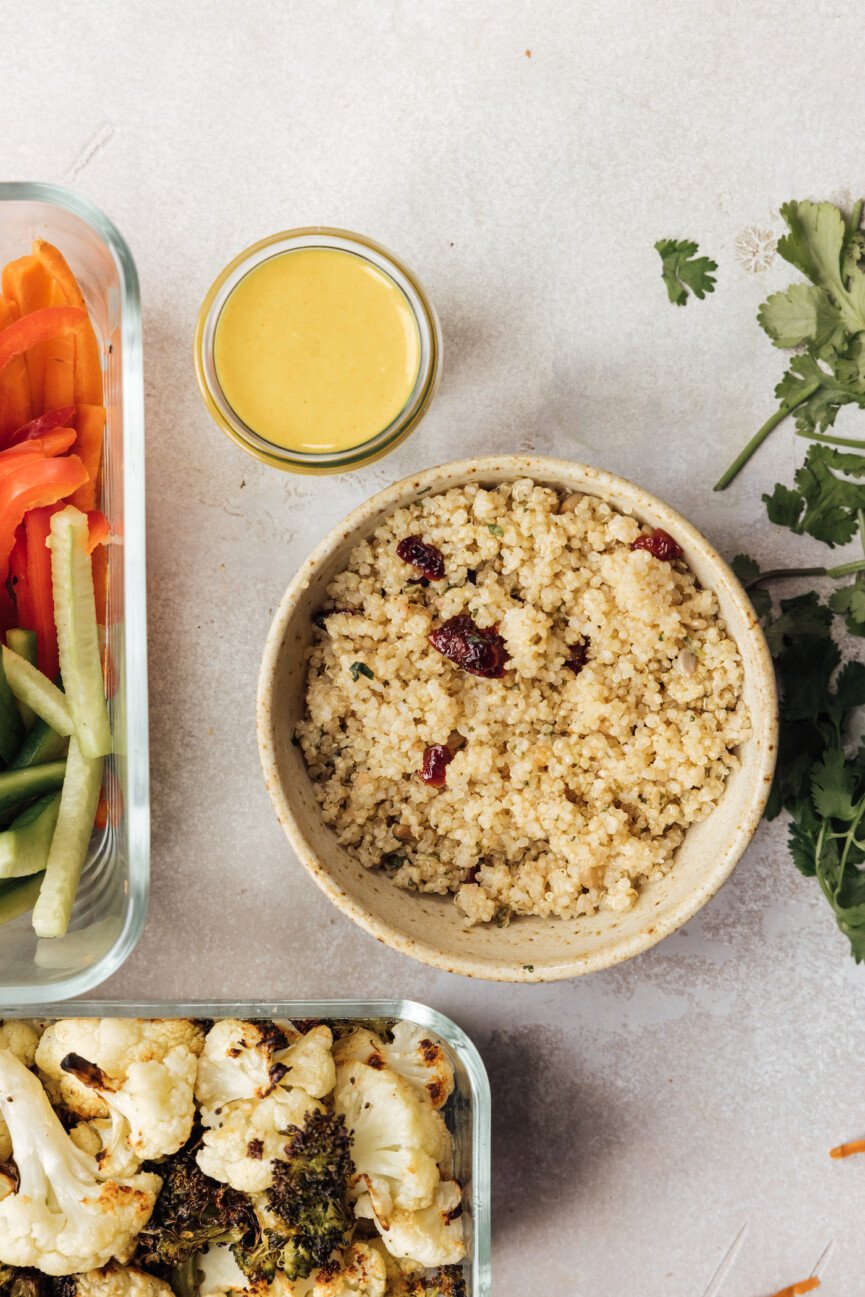
Cook the Grains
A container of cooked grains is one of the most versatile items you can have in your fridge. Cooked grains like farro or quinoa make a great side dish to any protein, or use as the base for a grain bowl, top with an egg, or even warm it up and add nut milk and cinnamon for a breakfast porridge.
Today I’m using quinoa. I love its chewy consistency and plant-based protein, but you can use farro, buckwheat, rice, amaranth, or any others. Here’s how to perfectly cook quinoa:
- Rinse 1 cup quinoa in a mesh strainer, then place in a small saucepan.
- Add 1 cup water and a pinch of salt, then bring to a boil.
- Once boiling, immediately reduce heat to low and cover. Let simmer for 20 minutes, fluffing with a fork halfway through to ensure quinoa isn’t sticking to the bottom of the saucepan.
- When it’s cooked, I place a folded dish towel between the pot and a lid while it cools to remove excess moisture.
Cooked quinoa keeps in the fridge for five days. To freeze cooked grains, spread them in a single layer on a baking sheet, and transfer to the freezer for at least two hours. After the grains are frozen, you can store them in a freezer-safe container.
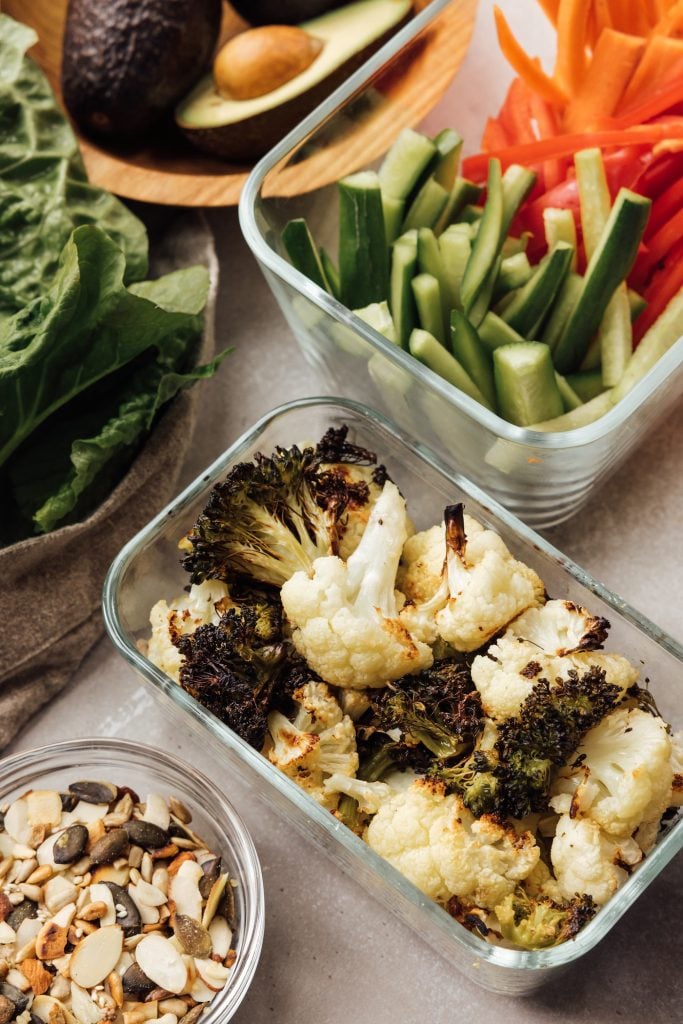

Roast Veggies
Pretty much any vegetable tastes way better roasted—cooking at a high heat concentrates the flavor and gives a caramelization that I love.
Here are a few of my favorite veggies to roast:
- sweet potatoes
- broccoli
- cauliflower
- butternut squash
- beets
- baby red potatoes
- cabbage
- brussels sprouts
- tomatoes
- eggplant
Add spices and herbs so that they always taste different and interesting. Sometimes I’ll toss mine in taco seasoning, other times I might drizzle with harissa or infused vinegar, or even just keep it simple with a pinch of Italian seasoning. Salt and pepper is always a must. Once made, they’re a perfect addition to salads, grain bowls, tacos, and sandwiches.
Here’s the perfect method for roasting just about any type of veggie:
- Preheat oven to 400 F.
- Line a baking sheet with parchment paper, and spread the veggies in a single layer, leaving some room around them so they roast instead of steam. You want the edges to get crispy and brown.
- Drizzle with olive oil, salt, pepper (and any other spices you’re using) and toss them around. Roast until caramelized. (Cooking time will vary based on the veg.)
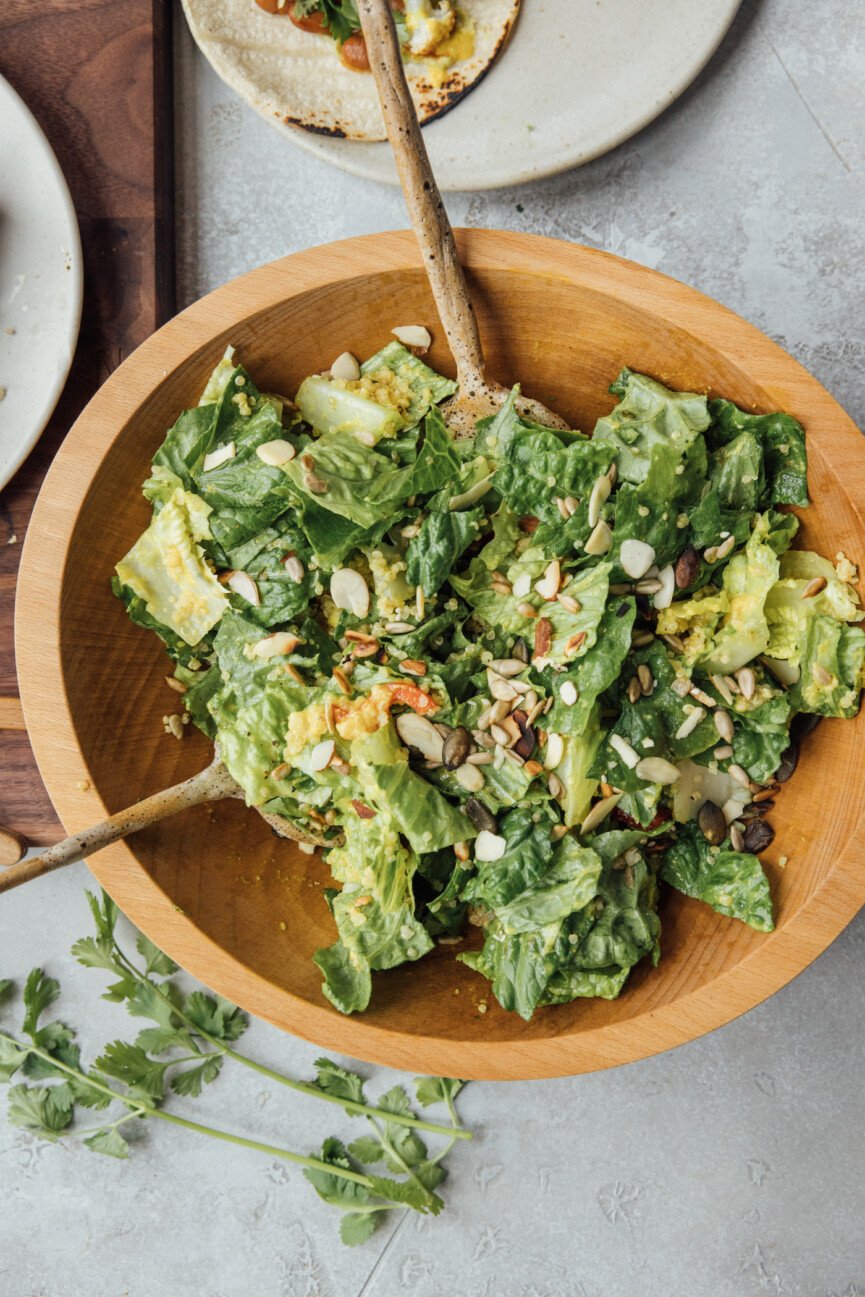
Make a Dressing or Sauce
This is the step that gets me excited about using my prepped veggies throughout the week. Grains and veggies can get a little boring without a flavor-packed sauce to drizzle over everything and make it devourable. Having a mason jar full of dressing at the ready means you have a salad dressing and a sauce for bowls, tacos, and veggie sides. You can drizzle over a roasted sweet potato or use as a dip for raw veggies. It’s truly your best friend when it comes to making easy and delicious meals in a flash.
This week, I’m making one of my favorites, Turmeric Vinaigrette. It’s super simple to make—just add all these ingredients to the blender:
- 1 shallot, peeled and halved
- 1 clove garlic
- 2 tablespoons apple cider vinegar
- 2 tablespoons warm water
- 2 teaspoons dijon mustard
- Squeeze of honey
- Teaspoon of ground turmeric
- big pinch of salt and pepper
- ½ cup extra-virgin olive oil
Blend everything up, then store in a mason jar all week.
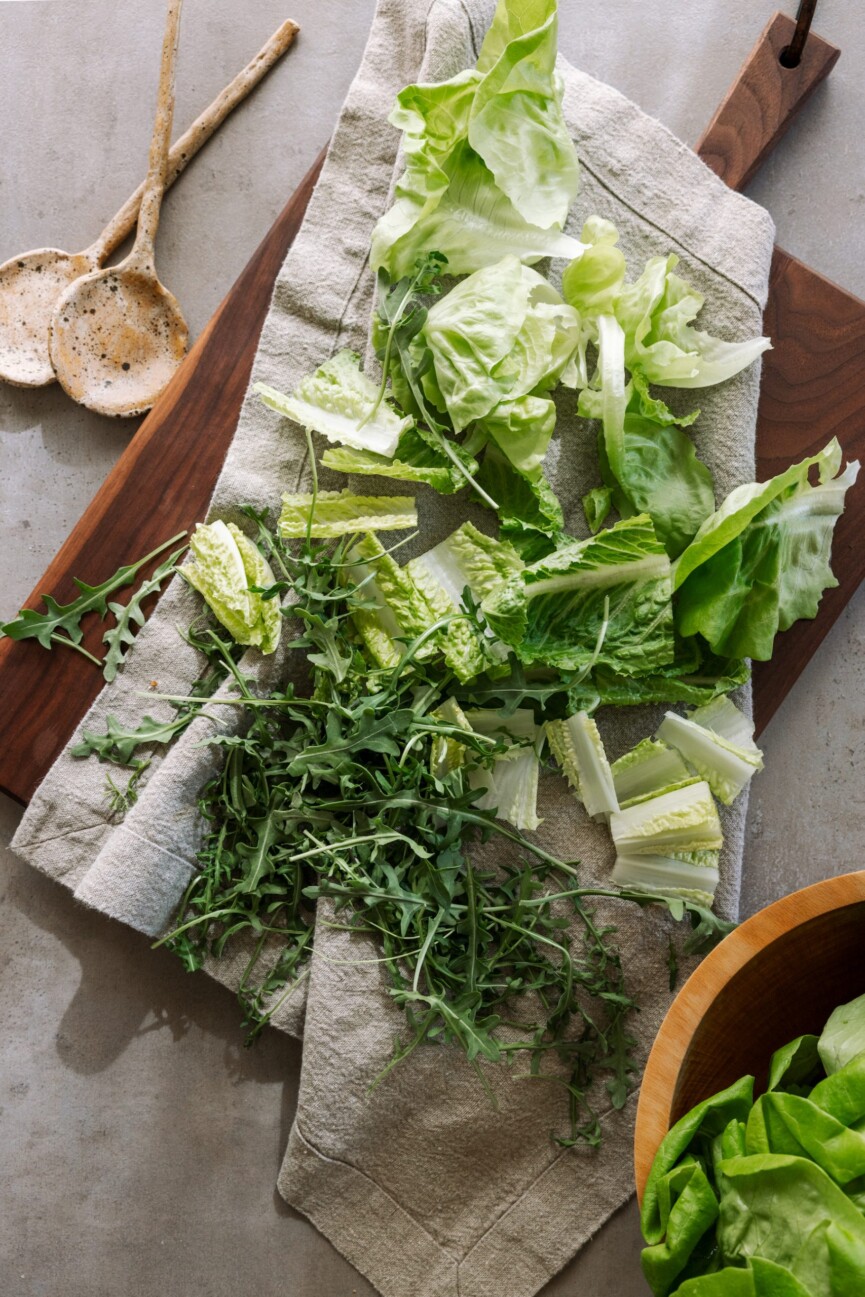
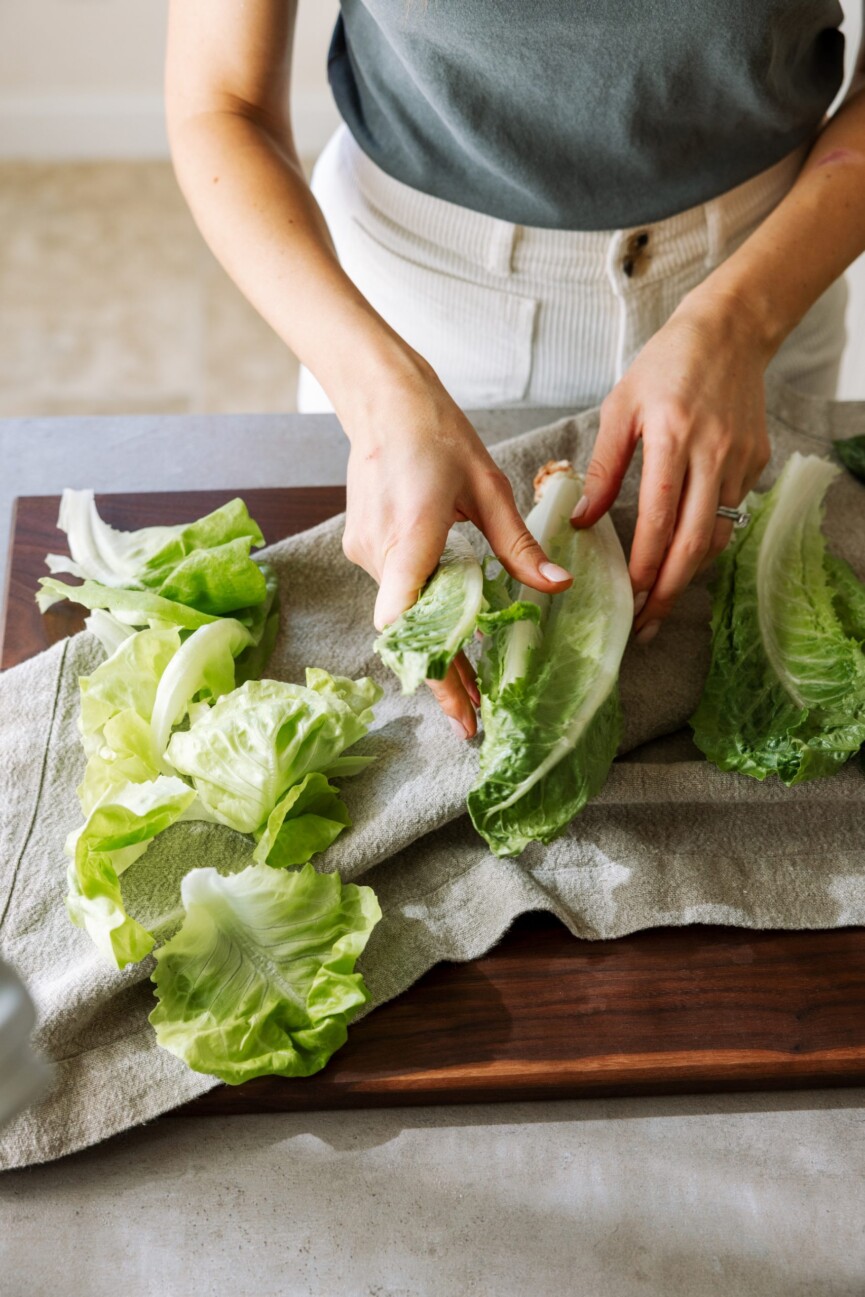
Prep Your Salad Greens and Raw Veggies
Are you 10x more likely to eat your veggies if they’re already washed and prepped in the fridge? SAME. And my kids are, too. I’ve started keeping a lidded container in the fridge full of chopped carrots, cucumbers, and bell peppers so that when they come into the kitchen looking for a snack right before dinner, I can point them to the crudité bowl. And we always have guacamole, hummus, or my weekly salad dressing (above) that they can pair with their veggie for dipping.
Plus, when you have fresh lettuces and other chopped veggies at the ready, it’s so easy to throw together a salad with whatever dinner you’re serving. I’d much prefer to do all the prep in one go, rather than getting out my salad spinner and cutting board over and over. Here’s what I do after my weekend grocery run:
- Wash and dry my lettuce in a salad spinner, then wrap in paper towels to absorb moisture and store in the produce drawer of the fridge.
- Peel and slice carrots, cucumbers, celery, bell peppers, and any other raw veggies I have laying around, so I can easily throw them into school lunches during the week.
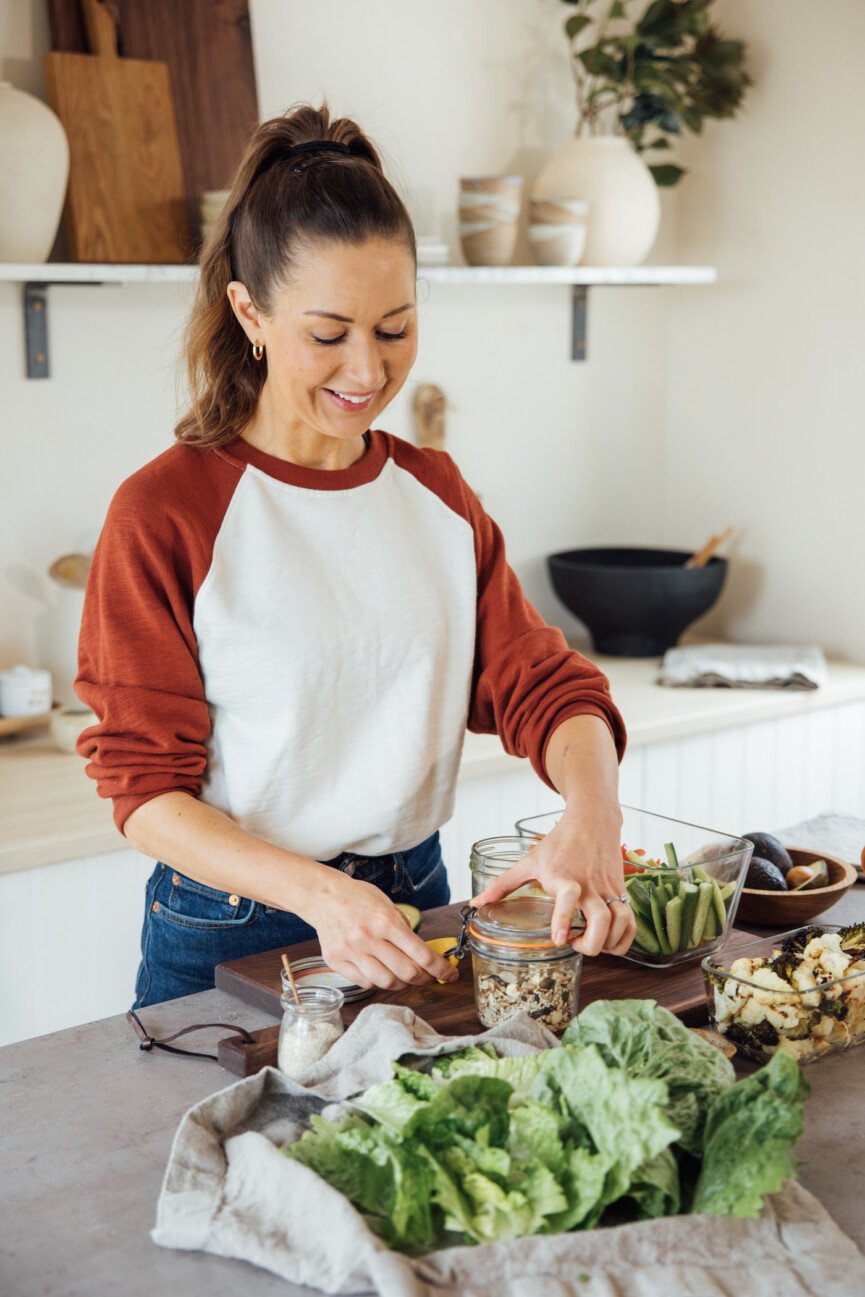
Make the Spicy Seed Mix
I’m big on adding crunch to just about everything—sometimes it’s just a handful of chopped nuts or seeds, but I love to have some kind of spicy seed mix in the fridge that I can sprinkle on everything from salads to bowls to veggie sides. It just gives it that little something, ya know?
This recipe is super adaptable to any seed, nut, or spice you have on hand. Sometimes I go a little sweeter and add maple syrup or orange zest, but today I’m going savory with sea salt and coriander. Here’s what I do:
- In a small sauté pan, add pumpkin seeds, sliced almonds, and sunflower seeds. Toast on low until they start to smell fragrant, then add sesame seeds, a pinch each of sugar and salt, and some coriander.
- Toast until everything starts to get a little golden brown, then transfer to a mason jar and store in the fridge.

